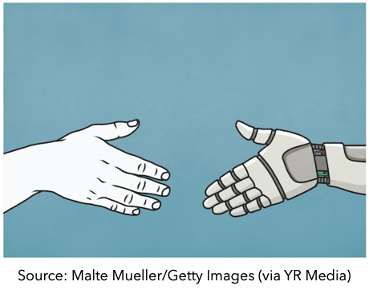 Artificial Intelligence (AI) encompasses one of the most complex scientific and engineering challenges in history (West & Allen, 2018; Anderson et al, 2018). With the rapid development of technology, AI permeates essentially all sectors of the economy and society. From speech recognition and natural language processing used to run chatbots or social media bots to interactive filters on Zoom meetings to social media platforms curating “news” feeds and advertising to smartphones that recognize fingerprint and facial patterns to educational assessment tools for proctoring tests to surveillance technology embedded in our public and private spaces, AI is rapidly reshaping the digital landscape as well as the future of work.
Artificial Intelligence (AI) encompasses one of the most complex scientific and engineering challenges in history (West & Allen, 2018; Anderson et al, 2018). With the rapid development of technology, AI permeates essentially all sectors of the economy and society. From speech recognition and natural language processing used to run chatbots or social media bots to interactive filters on Zoom meetings to social media platforms curating “news” feeds and advertising to smartphones that recognize fingerprint and facial patterns to educational assessment tools for proctoring tests to surveillance technology embedded in our public and private spaces, AI is rapidly reshaping the digital landscape as well as the future of work.
AI holds promise in an array of fields. Its proponents predict sweeping economic and societal benefits (McKinsey Global Institute, 2018). However, we must also consider the potential risks (Bornstein & Howard, 2021). Racial and gender-based discrimination has been shown to arise from implicit biases built into the algorithms. Training data used to develop AI systems routinely exclude people of color, women, and other historically marginalized groups, leading the technology to make decisions based on skewed representations of the human world (Silberg & Manyika, 2019). This has resulted in harmful discrimination based on race and gender. 
To mitigate these risks, it is important to educate the next generation of AI users and creators on how AI operates and how to responsibly harness its power.
With an eye to developing the creative talents and resources of young people historically underrepresented in STEM pathways, YR Media’s Understanding AI project explored the role of AI as a shaping force in collaboration with the next generation of AI users and creators. This NSF-sponsored AISL project leveraged YR Media’s national network of youth producers and collegial pedagogy model to design and research youth-interest-driven media deeply examining AI.
By tackling AI within the context of youth media, the project critically reflected on how diverse youth and educators can collaborate to research and tell stories about AI’s social and cultural significance and most pressing ethical issues.
Rockman et al Cooperative (REA) conducted an independent evaluation to inform and assess the project’s implementation and outcomes. Using a case study approach that drew on repeated youth surveys, observations of learning activities, and both short and extended interviews with participants and outside audiences, REA’s evaluation explored the context of teaching, learning, and communicating about AI through youth media.
Our evaluation showed that YR Media sustained a learning community that consciously centers young people’s interests and lived experiences with technology. By combining journalism, social science and participatory methods with design principles and coding, YR Media leveraged the power of human collaboration, interdisciplinary creativity, and equity-centered thinking with new and old technologies (e.g. Lee, Gobir, Gurn & Soep 2022; Lee & Soep, 2023). YR’s research and REA’s evaluation illustrated the viability of adapting “computer science education to embed computational thinking inside a youth-driven newsroom where content is tethered to truth, aimed towards justice, shared with the public, and brought to life through creative expression” (Lee et al, 2022, p. 3). By positioning youth as co-creators working with their peers and STEM media professionals, YR Media provided systematic opportunities for young people to connect computational expression to civic participation.
Read REA’s final report on the CAISE Repository: Understanding AI: Exploring YR Media’s Innovative Approaches to Informal Education in Artificial Intelligence.
Citations
Anderson, J., Rainie, L.. & Luchsinger, A. (2018). Artificial Intelligence and the Future of Humans. Washington, DC: Pew Research Center
Borenstein, J. & Howard, A. (2021). Emerging challenges in AI and the need for AI ethics education. AI Ethics, 1, 61–65.
Lee, C., Gobir, N., Gurn, A., & Soep, E. (2022). In the Black Mirror: Youth Investigations into Artificial Intelligence. ACM Transactions on Computing Education. https://doi.org/10.1145/3484495
Lee, C. & Soep, E. (2023). Code for What? Computer Science as a Medium for Storytelling and Justice.
McKinsey Global Institute (2018). The promise and challenge of the age of artificial intelligence. McKinsey & Company. Available at: https://www.mckinsey.com/featured-insights/artificial-intelligence/the-promise-and-challenge-of-the-age-of-artificial-intelligence
Silberg, J. & Manyika, J. (2019). Notes from the AI frontier: Tackling bias in AI (and in humans). McKinsey Global Institute. Available at: https://www.mckinsey.com
West, D. & Allen, J. (2018). How artificial intelligence is transforming the world. Brookings: Center for Technology Innovation. Available at: https://www.brookings.edu/research/how-artificial-intelligence-is-transforming-the-world/